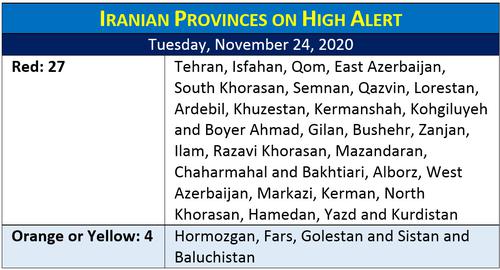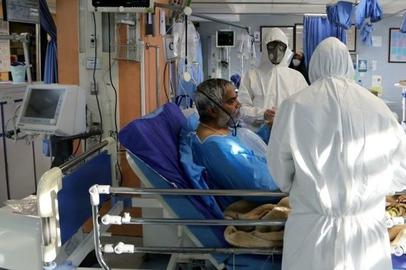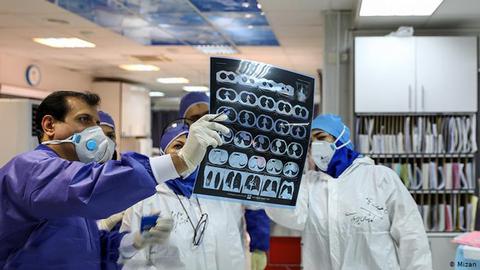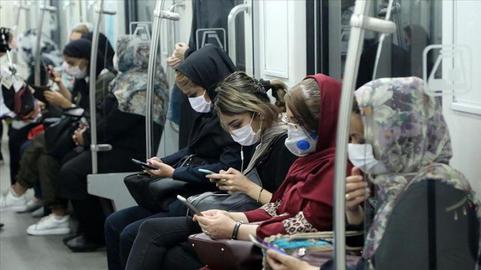Following the resignations of two senior health ministry officials, the ministry has admitted that it funded research into “alternative” or “traditional” medicine to treat people with Covid-19. The ministry has also conceded that its strategy to combat the coronavirus crisis has been inefficient and lacked transparency.
“There is such a thing as traditional medicine and it even has its own university and its own specialists, but they must follow modern methods of research to have something to offer,” said Dr. Minoo Moharez from the National Coronavirus Taskforce’s Scientific Committee after the health ministry recently issued permits for four herbal drugs to be used to treat coronavirus. “On the other hand, herbal medicine shops [or “spice shops” as they are traditionally called in Iran] must be taken out of the loop. We cannot accept spice shops because they exploit this kind of medicine in an improper way. Traditional medicine exists and we accept it, but not in this way.”
Prior to this, Mohammad Reza Zafarghandi, president of the Iranian Medical Council, had asked the Food and Drug Administration to provide the council with the scientific evidence that led to the approval of the four herbal medicines. The resignation of deputy health Minister Reza Malekzadeh followed. “All advanced countries rely on vast clinical trials to identify medicines for treating coronavirus. Iran cannot rely on treatments prompted by the supporters of pseudo-science who have no knowledge of modern medical science and of the complexities of coronavirus and who do not bother to do any scientific research,” he wrote in his letter of resignation.
At the same time, Iran welcomed the news that Western pharmaceuticals had successfully developed vaccines for Covid-19. Officials also said that efforts to develop a vaccine in Iran continue.
On the third day of Iran’s city lockdowns, reports from around the country indicate a tangible drop in the traffic between metropolitan areas. After tens of thousands of people were fined for violating the restrictions and some businesses were forced to bring their shutters down, it appeared that people were starting to take the ordinance issued by the National Coronavirus Taskforce more seriously.
Statistics show the number of fatalities in Tehran has dropped, but the number of patients who require hospitalization continues to rise in the nation’s capital. Figures issued by the health ministry do not show any meaningful changes in the number of infections and fatalities from recent weeks although it is too soon for the lockdowns to have had any substantial effects. It will be possible to establish a clearer picture in two weeks' time.
12 Percent Drop in Number of Coronavirus Fatalities in Tehran
Hasan Khalilabadi, a member of Tehran City Council, reported that the number of coronavirus deaths in the Iranian capital had dropped by 12 percent to 131 in the past 24 hours. He attributed this drop partly to restrictions and said that recent fatalities were mostly patients who were in critical condition in hospitals.
Nahid Khoda-Karami, a member of Tehran City Council’s Health Committee, reported that, based on figures provided by the health ministry and Tehran’s Behesht Zahra Cemetery, more than 19,000 people have died from coronavirus in Tehran since the pandemic started.
Patients Waiting to be Hospitalized
The number of fatalities in Tehran might be dropping, but the number of patients who need to be hospitalized is rising. According to Dr. Reza Jalili Khoshnood, president of Tajrish Shohada Hospital in northern Tehran, as of November 24, 30 patients were on a waiting list for hospitalization. “Unfortunately many treatment centers have run out of room but, thank God, we don’t have this problem.”
Provinces Round-up
The number of new coronavirus cases continues to rise in Alborz province. In the 24-hour period spanning November 23 and November 24, 97 new patients with Covid-19 were hospitalized. As of November 24, 842 people with confirmed and suspected coronavirus cases were hospitalized in the province. In the same 24 hours, 20 Covid-19 patients died, bringing the official death for the province to 2,206.
In Kermanshah as of that date, 889 people with suspected coronavirus cases were hospitalized across the province. Out of this number 166 were being treated at ICUs and 44 of these patients were connected to ventilators. In the last 24 hours, 18 other Covid-19 patients died and the total coronavirus death toll for the province currently stands at 1,119.
Kurdistan province is also in a dangerous situation. In the last 24 hours, 287 patients tested positive for coronavirus. As of November 24, 647 Covid-19 patients were hospitalized across Kurdistan, the highest number of whom, 419, are in the provincial capital of Sanandaj. During the same time period, six other coronavirus patients died, bringing the death toll for the province to 886.
Iran’s Latest Coronavirus Statistics
In her daily briefing for November 24, the health ministry spokeswoman Dr. Sima Sadat Lari announced the official coronavirus statistics for the last 24 hours:

Dr. Lari also reported that all 31 Iranian provinces are in red, orange or yellow states of alert.

This is part of IranWire's coronavirus chronology. Read the full chronology
visit the accountability section
In this section of Iran Wire, you can contact the officials and launch your campaign for various problems




























comments